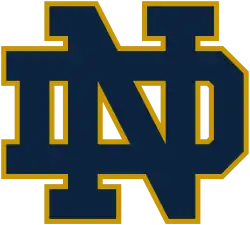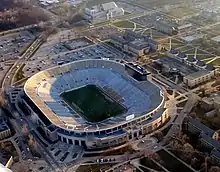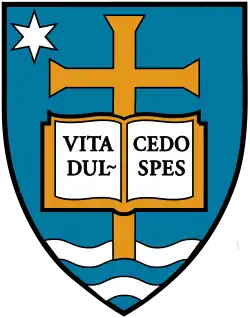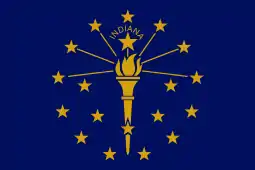Notre Dame Fighting Irish
The Notre Dame Fighting Irish are the athletic teams that represent the University of Notre Dame. The Fighting Irish participate in 23 National Collegiate Athletic Association (NCAA) Division I intercollegiate sports and in the NCAA's Division I in all sports, with many teams competing in the Atlantic Coast Conference (ACC).[2] Notre Dame is one of only 16 universities in the United States that plays Division I FBS football and Division I men's ice hockey. The school colors are Gold and Blue[3] and the mascot is the Leprechaun. It was founded on November 23, 1887 with football in Notre Dame, Indiana.
| Notre Dame Fighting Irish | |
|---|---|
 | |
| University | University of Notre Dame |
| Conference | Atlantic Coast Conference Big Ten (men's ice hockey) Independent (football) |
| NCAA | Division I (FBS) |
| Athletic director | Jack Swarbrick |
| Location | Notre Dame, Indiana |
| Varsity teams | 23 |
| Football stadium | Notre Dame Stadium |
| Basketball arena | Edmund P. Joyce Center |
| Baseball stadium | Frank Eck Stadium |
| Softball stadium | Melissa Cook Stadium |
| Soccer stadium | Alumni Stadium |
| Other arenas | Arlotta Family Lacrosse Stadium Castellan Family Fencing Center Compton Family Ice Arena Courtney Tennis Center Eck Tennis Pavilion Loftus Sports Center McConnell Family Boathouse Notre Dame Golf Course Notre Dame Track and Field Stadium Rolfs Aquatic Center Warren Golf Course |
| Mascot | Leprechaun |
| Nickname | Fighting Irish |
| Fight song | Notre Dame Victory March |
| Colors | Blue and Gold[1] |
| Website | www |
 | |
History of the Fighting Irish

Moniker
Just exactly where the moniker "Fighting Irish" came from is a matter of much debate and legend. One possibility is that the nickname is inherited from Irish immigrant soldiers who fought in the Civil War with the Union's Irish Brigade. Notre Dame's claim to the nickname would seem to come from the presence of Fr. William Corby, CSC, the third president of Notre Dame, who was at the Battle of Gettysburg. Fr. Corby served as chaplain of the Irish Brigade and granted general absolution to the troops in the midst of the battle. This is commemorated in the painting "Absolution Under Fire," part of Notre Dame's permanent art collection. A print of the painting "The Original Fighting Irish" by former Fighting Irish lacrosse player Revere La Noue is on permanent display at Notre Dame's Arlotta Stadium. The print also hangs in the office of head Notre Dame football coach Brian Kelly, who said that he had to have the work which captures the "swagger" and "toughness" of the football program after seeing it online.[4][5]
The athletes and teams at Notre Dame, now known as the Fighting Irish, were known by many different unofficial nicknames throughout the late 19th and early 20th centuries. During the Knute Rockne football era, Notre Dame had several unofficial nicknames, among them the "Rovers" and the "Ramblers". These names reflected the teams' propensity to travel the nation to play its football contests, long before such national travel became the collegiate norm. Later, Notre Dame was known unofficially as the "Terriers," after the Irish breed of the dog, and for some years, an Irish Terrier would be found on the ND football sidelines.
One theory traces back to the visit from Irish freedom fighter and later President of the Republic of Ireland, Éamon de Valera, who had been part of the 1916 Easter Rising and was imprisoned and sentenced to death. He was given amnesty, elected to Parliament and arrested by the authorities again. He escaped and slipped off to America to avoid recapture. Barnstorming the country, the future president of Ireland was welcomed as a hero at Notre Dame on October 15, 1919. Accounts in Scholastic, a student publication, indicate that his visit tilted campus opinion in favor of the "Fighting Irish" moniker — though not completely. De Valera planted a "tree of liberty" as a memorial of his visit — only to have it uprooted a week later and thrown in one of the campus lakes by a student "of Unionist persuasion."[6]
There are several other legends of how Notre Dame came to be the "Fighting Irish." One story suggests the moniker was born in 1899 during a game between Notre Dame and Northwestern. The Fighting Irish were leading 5–0 at halftime when the Wildcat fans began to chant, "Kill the Fighting Irish, kill the Fighting Irish," as the second half opened.[7] Another tale has the nickname originating at halftime of the Notre Dame-Michigan game in 1909. With his team trailing, one Notre Dame player yelled to his teammates —who had names like Dolan, Kelly, Donnelly, Glynn, Duffy, and Ryan— "What's the matter with you guys? You're all Irish and you're not fighting worth a lick." Notre Dame came back to win the game, and (someone in) the press, after overhearing the remark, reported the game as a victory for the "Fighting Irish."
Conference affiliations
Notre Dame was a member of the "old" Big East Conference until 2013. It is currently a member of the Atlantic Coast Conference (ACC) in all sports except for the following:
- Football, in which the university maintains its status as an independent university. It is a member of the Football Bowl Subdivision, and for postseason purposes Notre Dame is the only independent with the privileges granted to teams in the Power Five conferences.
- Because of the COVID19 pandemic, the 2020 football team plays a full ACC schedule with eligibility for the ACC Championship Game.
- Men's ice hockey competes in the Big Ten. Their former hockey conference, the Central Collegiate Hockey Association, disbanded after the 2012–13 season due to a major realignment of hockey conferences. The Irish then spent three seasons as a member of Hockey East before joining the Big Ten.
According to men's basketball coach Mike Brey, Notre Dame seriously considered joining the Big Ten in 2003, with the decision not to proceed occurring at the "11th hour".[8]
Sports sponsored
| Men's sports | Women's sports |
|---|---|
| Baseball | Basketball |
| Basketball | Cross country |
| Cross country | Golf |
| Football | Lacrosse |
| Golf | Rowing |
| Ice hockey | Soccer |
| Lacrosse | Softball |
| Soccer | Swimming and diving |
| Swimming and diving | Tennis |
| Tennis | Track and field† |
| Track and field† | Volleyball |
| Co-ed sports | |
| Fencing | |
| † – Track and field includes both indoor and outdoor | |
Football
- Head Coach: Brian Kelly
- Stadium: Notre Dame Stadium
- National Championships: 11 Consensus (1924, 1929, 1930, 1943, 1946, 1947, 1949, 1966, 1973, 1977, 1988). There are other years (1919, 1920, 1927, 1938, 1953, 1964, 1989, 1993, 2012) where various polls claim Notre Dame as a National Champion, but those years are not consensus titles, and thus are not claimed by the university.
The school has a comprehensive and nationally competitive Division I athletic program, but it is most famous for its football program. Notre Dame fielded its first football team in 1887. With eleven football championships acknowledged by the NCAA, over 800 all-time wins, seven Heisman Trophy winners, famous head coaches, a 73.6% winning percentage and the most consensus All-Americans of any school, Notre Dame football is one of the most storied programs both on the gridiron and college athletics in general. Recently, Notre Dame has struggled, going through several head coaches and setting the all-time bowl losing streak of nine straight with the loss to LSU in the 2007 Sugar Bowl before beating Hawaii in the 2008 Hawaii Bowl. Notre Dame is also the only football program in the nation, including both collegiate and professional ones, with every home game being on national broadcast television.
In addition to having the oldest university marching band in the country, the school has many rivalries in football, the most famous ones being with USC, Navy, Michigan State, Army, Purdue, and Michigan. Notre Dame played in arguably the greatest, although certainly not the most-watched (due to Notre Dame games' already having been broadcast nationally that season as many times as allowed, ABC had to relegate its broadcast to a regional one), college football game in history: the famous 10–10 tie against Michigan State at Spartan Stadium on November 19, 1966. Other Notre Dame rivalries include those with Stanford, Boston College, and Pittsburgh. Former rivalries include a very intense rivalry in the 1980s with Miami (Catholics vs. Convicts), and a rivalry with Penn State, which was renewed and played on September 9, 2006, and again during the 2007 season. The football program is also known for ending the Oklahoma NCAA record winning streak of 47 games. The streak-ending game was a 7–0 victory for the Fighting Irish on November 9, 1957. Incidentally, Oklahoma's 28–21 loss to Notre Dame to open the 1953 season was the last loss before the beginning of the streak. In 2012, Oklahoma (at the time 6-1) was favored to defeat Notre Dame (at the time 9-0) by 18 points. Notre Dame ending up winning 30–13 thanks to LB Manti T'eo's game clinching interception late in the 4th quarter, Notre Dame's stellar defense, and a bad snap in the first quarter by Oklahoma's center that sent them back to the 14-yard line. Thanks to the win by Notre Dame, the rivalry has been renewed. The last time Notre Dame reached the National Championship was in 2012 where they suffered a 42–14 loss to Alabama.
Men's
- Head Coach: Mike Brey
- Arena: Purcell Pavilion at the Joyce Center
- ACC Titles: 2015
- National Championships: 2 (1927*, 1936*)
- Final Fours: 1 (1978)
* Pre-tournament era Helms Trophy
The men's basketball team, coached by Mike Brey since 2000, has made 28 NCAA Tournament appearances and made it to the Final Four in 1978 under coach Digger Phelps. They are also known for ending UCLA's 88-game winning streak in 1974, a streak which had begun after Notre Dame had previously ended UCLA's 45-game winning streak in 1971. Notre Dame won the 2015 ACC Tournament and advanced to the Elite Eight only to fall to top-ranked Kentucky 68-66. The next year they would make another Elite Eight, yet lose to North Carolina.
Women's
- Head Coach: Muffet McGraw
- Arena: Purcell Pavilion at the Joyce Center
- ACC Titles: 4 (2014, 2015, 2016, 2017)
- National Championships: 2 (2001, 2018)
- Final Fours: 9 (1997, 2001, 2011, 2012, 2013, 2014, 2015, 2018, 2019)
Notre Dame's women's basketball team is a perennial championship level program which has been consistently ranked in the top 5 in the country for the past 8 years, notching 8 consecutive 30+ win seasons. Coach Muffet McGraw has led the Fighting Irish to 25 NCAA tournament appearances including a current streak of 23 straight, winning two national championships and 8 Final Four appearances.
The Irish won their first National Championship in 2001 by beating Purdue 68–66. The 2001 team was led by 6-foot-5 center Ruth Riley, a recent inductee into the Women's Basketball Hall of Fame. McGraw would take the Fighting Irish back to the Final Four in 2011, beating Pat Summitt's Tennessee Lady Volunteers; this was the program's first win against the Lady Vols in 21 tries. That win was followed by an upset of the number one-ranked UConn Huskies (making Notre Dame the first team ever to beat both Tennessee and UConn in the same tournament) to advance the Fighting Irish to the 2011 championship game, where it lost to Texas A&M. The Irish would return to the championship game in 2012, 2014, and 2015, losing to Baylor once and Connecticut twice. After an injury plagued start to the 2018 season, which saw four Irish players lost to injury, Notre Dame won its second National Championship in 2018 by beating Mississippi State 61–58. Guard Arike Ogunbowale scored the game winning three point shot with 0.1 seconds left, two days after scoring a similar buzzer-beater to knock out Connecticut in the semifinal game. The win was coach McGraw's second national championship and 800th career win.
Fencing
The Notre Dame men's and women's fencing teams have won 10 national titles — the men's team won titles in 1977, 1978 and 1986 while the women's team won the 1987 title. After the NCAA replaced the individual men's and women's national titles with a combined fencing championship, Notre Dame won national titles in 1994, 2003, 2005, 2011, and most recently, in 2017 and 2018. During the 2010 regular season, Notre Dame went undefeated in both men's and women's fencing. Notre Dame alumna, Mariel Zagunis, became the first U.S. fencer to win an Olympic gold medal in 100 years in 2004 and the first U.S. women's fencer to win a gold medal.[9]
Ice hockey
- Head Coach: Jeff Jackson
- Arena: Compton Family Ice Arena[10] (Formerly at Joyce Center, 1968–2011)
- Conference Titles: (CCHA) 3 (2007, 2009, 2013) (Big Ten) 1 (2018)
- Frozen Four Appearances: 4 (2008, 2011, 2017, 2018)
Notre Dame's men's ice hockey team, coached by Jeff Jackson and captained by T.J. Jindra, won both the Central Collegiate Hockey Association (CCHA) season and tournament championships in 2007 with a record of 28-6-3. They were the #2 overall seed in the 2007 NCAA Men's Hockey Tournament, behind Minnesota, and were the #1 seed in the Midwest bracket. They lost to Michigan State in the second round of the NCAA tournament.
Notre Dame was a #4 seed in the 2008 NCAA Tournament and faced #1 seed New Hampshire. They beat New Hampshire 7-3 and then faced Michigan State, the same team that knocked them out of the tournament the previous year. This time, the Fighting Irish defeated the Spartans 3-1 and earned their first trip in school history to the Frozen Four. In the semi-final they defeated the overall #1 seeded Michigan 5–4 in overtime, earning them their first ever national championship berth against Boston College, in which they were defeated 4–1.
Notre Dame joined the Big Ten conference as sports affiliate member on July 1, 2017. They play along Michigan, Michigan State, Minnesota, Ohio State, Penn State, and Wisconsin in ice hockey.[11]
Men's
- Head Coach: Kevin Corrigan
- Field: Arlotta Stadium, Loftus Sports Center
- Conference Titles (MLA): 8 (1982, 1984, 1986, 1988, 1990, 1992, 1993)
- Conference Titles (GWLL): 12 (1994, 1995, 1996, 1997, 1999, 2000, 2001, 2002, 2003, 2007, 2008, 2009)
- NCAA Tournament Appearances: 22 (1990, 1992, 1993, 1994, 1995, 1996, 1997, 1999, 2000, 2001, 2006, 2007, 2008, 2009, 2010, 2011, 2012, 2013, 2014, 2015, 2016, 2017)
- Final Four Appearances: 5 (2001, 2010, 2012, 2014, 2015)
The Notre Dame men's lacrosse team has made the NCAA lacrosse tournament every year since 2006, reaching the national semifinals (Final Four) in 2001 and 2010 and the national championship game in 2010, in which it lost to Duke by one goal in overtime, 6-5. In 2009, the Fighting Irish went undefeated in the regular season, reached #2 in national polls, and finished with an overall record of 15–1. In 2014 #5 ranked Notre Dame advanced to the NCAA Championship match only to lose to #1 ranked Duke 11-9.
Women's
The Notre Dame women's lacrosse team reached the NCAA semifinal round (Final Four) in 2006. In 2010, they reached the NCAA tournament for the 3rd straight year, the longest streak in school history. The Fighting Irish advanced to the second round of the 2014 NCAA Lacrosse Championship before losing to Duke 10-8.
Men's
- Head Coach: Bobby Clark
- Field: Alumni Stadium
- National Championships: 1 (2013)
- College Cup Appearances: 1 (2013)
Women's
- Head Coach: Theresa Romagnolo
- Field: Alumni Stadium
- Conference Titles (MCC)*: 4 (1991, 1992, 1993, 1994)
- Conference Titles (Big East*): 10 (1995, 1996, 1997, 1998, 1999, 2000, 2001, 2005, 2006, 2008)
- National Championships: 3 (1995, 2004, 2010)
- College Cup Appearances: 17 (1993, 1994, 1995, 1996, 1997, 1998, 1999, 2000, 2001, 2002, 2003, 2004, 2005, 2006, 2007, 2008, 2009, 2010)
*Notre Dame was a member of the Midwestern Collegiate Conference and Big East Conference in soccer prior to joining the ACC in most sports.
Notre Dame's women's soccer team won the National Championship in 1995, 2004 and 2010 and were the runner-up in 1994, 1996, 1999, 2006, and 2008. Notre Dame is one of only three schools with multiple national titles, the others being North Carolina (21) and Portland (2). Notre Dame also ranks second in all-time title game appearances (8) behind North Carolina (23). ND's women's soccer program started in 1988 under coach Chris Petrucelli. Their 1995 Big East title was the university's first in any sport. That same year, Petrucelli's squad, under the leadership of Cindy Daws, won the program's first national title, defeating Portland 1–0. Notre Dame's current coach, Randy Waldrum, took over the program in 1999 and has maintained the Fighting Irish's success, winning the national title in 2004 by beating UCLA 4–3 as well as capturing six Big East titles. Waldrum's 2010 squad won the school's third national title, going 21-2-2 and posting 15 shutouts and became the lowest ranked team to do so, beating undefeated Stanford in a 1–0 decision. In doing so, they outscored their postseason opponents 15-1. They also reached the College Cup for the 5th straight year, a school record. Their senior class won 87 matches in their 4 years, the most in that span. Three Notre Dame players have won the Hermann Trophy, given to the United States' best male and female collegiate soccer players. They are Cindy Daws (1996), Anne Mäkinen (2000) and Kerri Hanks (2006, 2008). Hanks is one of only four players to win the award twice. Notre Dame is also one of only two schools with three or more different Hermann Trophy recipients.[12]
Men's golf
The men's golf team has won 11 conference championships:
- Horizon League (3): 1988–89, 1995
- Big East Conference (8): 1995–97, 2004–06, 2011–12
They won the NCAA Championship in 1944.
Club sports
Rugby
Founded in 1961, the Notre Dame rugby club was one of the oldest college rugby clubs in the Midwest, before the club was disbanded in 1995.[13] Notre Dame reinstated rugby in 2007, however, due in part to the "explosive growth of rugby in the nation's Catholic high schools" and Notre Dame's desire to offer a program to attract rugby-playing students.[14] Notre Dame began the 2007–08 season in Division 2, but their 8-1-1 record merited a promotion to Division 1 in the spring of 2008.[15]
Notre Dame finished the 2010–11 season ranked 19th in the nation.[16] Notre Dame's rugby program has the support and commitment of the school and alumni, with an endowment fund rumored to be over $1 million.[14] The team is coached by Justin Hickey. Notre Dame also plays every year in the Collegiate Rugby Championship (CRC). The CRC is the highest profile college rugby competition in the United States, broadcast live on NBC each year. Notre Dame finished 10th in the 2011 CRC, with wins over Boston College, Ohio State and Navy.
Other sports
John A. Kromkowski, (BA '60) (MA '61) (Phd '72), won the National Intercollegiate Men's Singles Table Tennis championship in 1959 defeating Paul S. Kochanowski (BA '61) 3–0. Playing together Kromkowski and Kochanowski won the Men's Doubles championship that year and they won the "Teams".[17]
Athletic facilities
- Alumni Stadium — Men's and women's soccer
- Arlotta Family Lacrosse Stadium — Men's and women's lacrosse
- Castellan Family Fencing Center — Men's and women's fencing
- Compton Family Ice Arena — Men's ice hockey
- Courtney Tennis Center — Men's and women's tennis
- Eck Tennis Pavilion — Men's and women's tennis
- Edmund P. Joyce Center — Men's and women's basketball, Women's volleyball
- Frank Eck Stadium — Baseball
- Loftus Sports Center — Men's and women's indoor track and field, Men's and women's lacrosse
- McConnell Family Boathouse — Women's rowing
- Melissa Cook Stadium — Softball
- Notre Dame Golf Course — Men's and women's cross country
- Notre Dame Stadium — Football
- Notre Dame Track and Field Stadium — Men's and women's outdoor track and field
- Rolfs Aquatic Center — Men's and women's swimming and diving
- Warren Golf Course — Men's and women's golf
Pageantry
- Team colors: Gold and Blue
- Outfitter: Under Armour
- Fight Song: Notre Dame Victory March
- Alma mater: Notre Dame, Our Mother
- Nicknames: Fighting Irish
- Rivalries: USC Trojans, Michigan Wolverines, Michigan State Spartans, Purdue Boilermakers, & Navy Midshipmen
- Mascot: The Leprechaun
- Marching Band: The Band of the Fighting Irish
Athletic directors
| Athletic director | Years |
|---|---|
| Jesse Harper | 1913–1917, 1931–1933 |
| Knute Rockne | 1920–1930 |
| Elmer Layden | 1934–1940 |
| Hugh Devore | 1945 |
| Frank Leahy | 1947–1949 |
| Moose Krause | 1949–1981 |
| Gene Corrigan | 1981–1987 |
| Dick Rosenthal | 1987–1995 |
| Mike Wadsworth | 1995–2000 |
| Kevin White | 2000–2008 |
| Jack Swarbrick | 2008–present |
References
- "Color | Athletics Branding | On Message | University of Notre Dame". Retrieved January 27, 2020.
- McMurphy, Brett. "Big East, Notre Dame agree on exit". ESPN. Retrieved March 12, 2013.
- "Gold and Blue". University of Notre Dame. Archived from the original on December 14, 2014. Retrieved March 28, 2015.
- Schlabach, Michael (April 7, 2010). "Kelly changing Notre Dame's focus". ESPN. Retrieved July 2, 2012.
- ""Inside The Walls Of Arlotta" To Re-Air At 4:30 p.m. (ET) On Friday". Archived from the original on September 14, 2015. Retrieved July 23, 2012.
- O'Shaughnessy, Brendan. "What's In A Name? How Notre Dame became the Fighting Irish". University of Notre Dame. University of Notre Dame. Retrieved November 23, 2015.
- "The Fighting Irish". University of Notre Dame. August 26, 2015. Archived from the original on March 6, 2016. Retrieved August 26, 2015.
- Greenstein, Teddy (January 8, 2010). "Mike Brey was preparing to join Big Ten in 2003". Chicago Tribune. Archived from the original on July 17, 2011. Retrieved April 20, 2010.
- "Mariel Zagunis - Fencing". UND Athletics. Retrieved June 12, 2019.
- "UND.COM – University of Notre Dame Official Athletic Site – Ice Hockey". und.com. Archived from the original on September 5, 2015. Retrieved July 22, 2011.
- "Big Ten Welcomes Notre Dame Men's Ice Hockey as Sport Affiliate Member". July 1, 2017. Archived from the original on August 25, 2017. Retrieved July 1, 2017.
- "2008 Women's Soccer Media Guide". Archived from the original on June 17, 2011. Retrieved April 8, 2009.
- "Archived copy". Archived from the original on February 14, 2012. Retrieved May 26, 2012.CS1 maint: archived copy as title (link)
- "eRugbyNews.com". eRugbyNews.com. December 31, 1969. Retrieved September 12, 2016.
- ENR // AgencyND // University of Notre Dame. "About // Notre Dame Rugby // University of Notre Dame". Rugby.nd.edu. Retrieved September 12, 2016.
- Boggan, T. History of U.S. Table Tennis, Vol III, Chapter XXXII (2003)
- "Facilities". und.com. Retrieved December 7, 2018.
External links
| Wikimedia Commons has media related to Athletics of the University of Notre Dame. |


